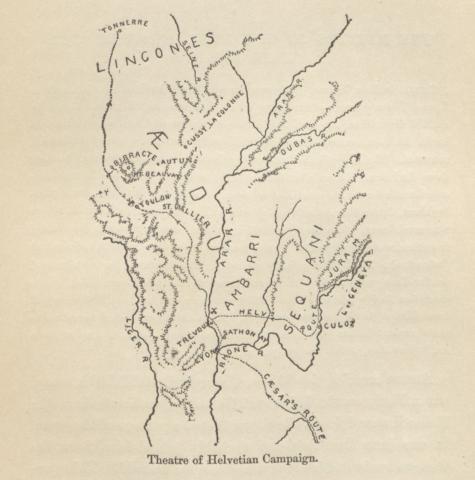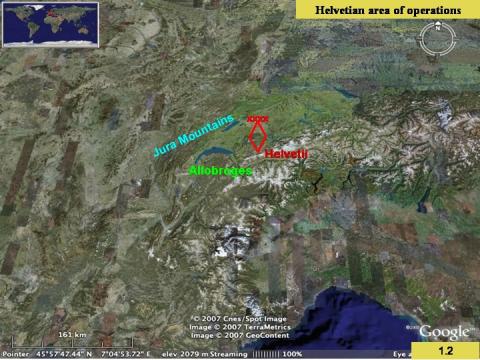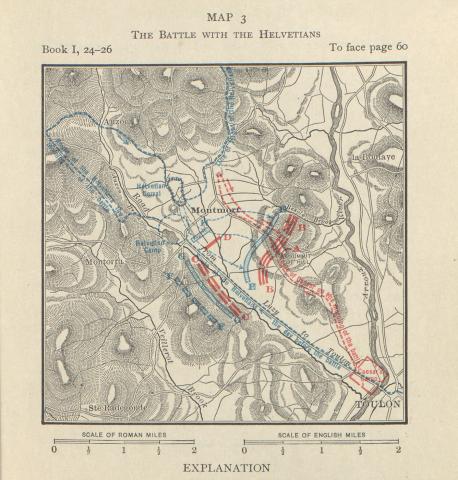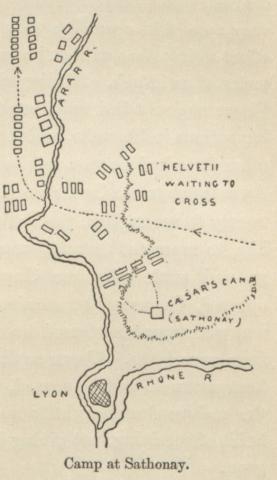Flūmen est Arar, quod per fīnēs Aeduōrum et Sēquanōrum in Rhodanum īnfluit, incrēdibilī lēnitāte, ita ut oculīs in utram partem fluat iūdicārī nōn possit. Id Helvētiī ratibus ac lintribus iūnctīs trānsībant. Ubi per explōrātōrēs Caesar certior factus est trēs iam partēs cōpiārum Helvētiōs id flūmen trādūxisse, quārtam ferē partem citrā flūmen Arārim reliquam esse, dē tertiā vigiliā cum legiōnibus tribus ē castrīs profectus ad eam partem pervēnit, quae nōndum flūmen trānsierat. Eōs impedītōs et inopīnantēs aggressus magnam partem eōrum concīdit: reliquī sēsē fugae mandārunt atque in proximās silvās abdidērunt. Is pāgus appellābātur Tigurīnus: nam omnis cīvitās Helvētia in quattuor pāgōs dīvīsa est. Hic pāgus ūnus, cum domō exīsset, patrum nostrōrum memoriā, L. Cassium cōnsulem interfēcerat et ēius exercitum sub iugum mīserat. Ita sīve cāsū sīve cōnsiliō deōrum immortālium, quae pars cīvitātis Helvētiae īnsignem calamitātem populō Rōmānō intulerat, ea prīnceps poenas persolvit. Quā in rē Caesar nōn sōlum pūblicās sed etiam prīvātās iniūriās ultus est, quod eius socerī L. Pīsōnis avum, L. Pīsōnem lēgātum, Tigurīnī eōdem proeliō quō Cassium interfēcerant.
notes
Caesar overtakes the Helvetii as they are crossing the Arar, and annihilates one division of their army.
Flūmen est Arar: “there is a river (called) Arar” (Harkness), the modern “Saône” (A-G). Caesar often introduces a transition of subject in this way (Walpole).
quod per fīnēs Aeduōrum et Sēquanōrum īnfluit: “[a river] which flows through … ,” not “between,” which would be expressed by dividit. The Saône joins the Rhône about 75 miles southwest of Lake Geneva (A-G). For a part of its course the Arar (Saône) formed the boundary between the Aedui and the Sequani, who engaged in violent strifes over the right, claimed by both, to levy tolls on passing vessels (Kelsey). Quod is in reference to its antecedent flūmen; some MSS. read quī, referring to Arar (Spencer).
incrēdibilī lēnitāte: “with remarkable gentleness,” as contrasted with the swift turbid waters of the Rhine and the rivers of Italy (L-W); “with wonderful smoothness,” more literally, “with a smoothness exceeding belief” (Anthon); “with unbelievably sluggish current,” ablative of description / quality (AG 415) (A-G) or manner (AG 412) (Hodges). Near Trévoux, 14 miles north of Lyon, the current of the Saône is today for a short distance as sluggish as in Caesar’s time; and here the Helvetians probably crossed the river (Kelsey).
in utram partem fluat: “in which direction” (Harkness); indirect question (AG 573), subject of iūdicārī possit (A-G).
ut … iūdicārī nōn possit: “that it cannot be determined” (Anthon); result/consecutive clause (AG 537).
ratibus: “rafts” of logs (A-G).
lintribus iūnctīs: “small boats” (Anthon) or “canoes” of hollowed logs, “joined” to make a kind of bridge (A-G).
trānsībant: notice the imperfect tense; they were in the act of crossing (A-G) at Mâcon or north of Trévoux (L-E). The Helvetii had proceeded about 100 miles from Lake Geneva (Hodges). Perhaps the Helvetii crossed the Saône at various points, for it has been suggested that if they had all crossed at one point, they would have opposed Caesar’s passage (Holmes).
explōrātōrēs: “patrols” (Holmes), usually detachments of mounted soldiers sent to reconnoiter (Hodges). The English equivalent is not “scouts,” which were known as speculātōrēs (Holmes).
trēs iam partēs cōpiārum Helvētiōs id flūmen trādūxisse: “that the Helvetii had by this time conveyed three parts of their forces across this river,” i.e., three fourths of their whole force. (Anthon). Helvētiōs is the subject of trādūxisse (M-T). Partēs is accusative governed by dūxisse in composition, and flūmen is accusative governed by trāns (Anthon). Verbs compounded with a preposition implying motion to or over may take an accusative of the place to which, or over which, the movement is made without repeating the preposition (AG 267). So too verbs compounded with a preposition implying motion from a place may take the ablative (M-T).
trēs partēs: Latin expresses fractions according to these rules (AG 135):
1) If the numerator is 1, express the fraction by the ordinal of the denominator with pars: e.g., 1/3 = pars tertia;
2) If the denominator is larger by one than the numerator, express by the cardinal of the numerator with partēs: e.g., ¾ = trēs partēs;
3) In other cases express the numerator by the cardinal, the denominator by the ordinal in the feminine plural (partēs understood): e.g., 4/7 = quattuor septimae (M-T).
citrā flūmen Arārim: “on this side of the Arar river” i.e., on the east side (Harkness), up which Caesar appears to have marched, so that he must have crossed it lower down from the territory of the Segusiavi, who lived on the west bank. The place where the Helvetii crossed the Arar has been fixed by different editors at Chalons (Cabillonum), Mâcon (Matisco), and not far above Lyon (Lugdunum) (M-T). Note the accusative –im ending of Arārim (it has both Arārī and Arāre for the ablative (H-T)). Gallic names were felt by the Romans as Greek and were treated accordingly (A-G).
reliquam: = relictam: in fact, this adjective is, from its meaning (“left behind”), a kind of participle (A-G).
dē tertiā vigiliā: “during (in the course of) the third watch” (L-E); “at the beginning of the third watch,” i.e., at midnight. Dē, when joined with words expressing time, indicates that a part of that time is spent along with the time which follows. Hence Caesar here set out before the third watch was at an end (Spencer). The Romans divided the night into four watches each of three hours. The first began at 6:00 in the evening, the second at 9:00, the third at midnight, and the fourth at 3:00 in the morning (Anthon); the length of each vigilia differed according to the season of the year (Spencer).
cum legiōnibus tribus: about 11,000 men (Kelsey); ablative of accompaniment (AG 413) (Hodges).
pervēnit: he marched north along the east bank of the Saône (L-E).
castrīs: Caesar was then encamped in the country of the Segusiavi, probably in the northern angle formed by the Rhône and the Saône (Hodges), not far from Lyon (Walpole). The Tigurini were evidently not more than a few miles north of Caesar’s camp; and we may infer that the route by which they had approached the Saône was the valley of the Formans which is dominated on the left by hills that would have screened the Roman column from observation as it marched from Sathonay (Holmes). The camps of the Romans were objects of particular attention, and were remarkable for their regularity and order. The proper situation was selected by persons sent in advance, under the direction of one of the tribunes. The form of the camp was usually square, divided into two parts, and strongly fortified with a ditch (fossa), generally nine feet deep and twelve broad, and rampart (vallum), made of the earth that was thrown up (agger), with stakes (vallī) fixed at the top of it. There were four gates, one on each side (Spencer).
eōs impedītōs et inopīnantēs adgressus: with these few words two sentences are concisely made into one; such telescoping of two coordinate ideas is a regular feature of Latin (A-G). The emphasis gives a force like “while these were hampered (i.e., unable to defend themselves on account of their burdens and because they were engaged in crossing the river (Hodges)) and not expecting (it), he engaged them … ” (Anthon). The fighting men, scattered throughout the encampment, were completely surprised and had no chance to form a line of battle; the Roman soldiers plied their savage short swords rapidly and effectively (Kelsey). Plutarch (Vit. Caes. 18) and Appian (Celtica 1.3) say that it was his lieutenant Labienus who attacked the Helvetii on this occasion; but, according to Caesar’s account, which, of course, is to be preferred, Labienus had been left in charge of the works along the Rhône (see Chapter 10) (Anthon). Caesar gave all his lieutenants, and especially Labienus, full credit for their exploits, and even if he had wished to rob Labienus of his due, he must have known that every officer in the army would detect his lie, and would make the truth known privately if not publicly (Holmes).
magnam partem eōrum concīdit: The place of this “slaughter” was probably a point about twelve miles above the junction of the Saône and the Rhône. The rest of the Helvetii had crossed here, or a little farther north (Hodges). Numerous burial mounds, both Roman and Celtic, have been unearthed on the site of this battle, showing that burial was performed in great haste (L-E). Carefully distinguish the verbs concīdō, concidō, and concēdō from one another (Hodges).
sēsē fugae mandārunt: = mandāvērunt (A-G) At all periods of the language there was a tendency to drop v between vowels. Doubtless in many cases the v was retained in the written form, but omitted in pronunciation (H-T). Sēsē is to be taken as the object of abdidērunt as well as of mandārunt (Hodges): “committed themselves to flight,” where we should say “took to flight” (Kelsey).
in proximās silvās: from the English point of view we might expect the ablative (place where (AG 421)), but we have the accusative here because the verb implies motion into (AG 426) (Walker): “they [fled] into the forests [and] hid themselves” (Harkness).
is pāgus appellābātur Tigurīnus: pāgus is used of local divisions of territory and also of the inhabitants of the divisions (Hodges). This “district” or “canton” Tigurīnus (i.e., “that of the Tigurini clan” (Anthon)) was about the modern-day Zurich. Its inhabitants probably composed a clan and formed a division of the force (A-G). Pāgus here takes the place of pars, which had been previously used in speaking of this division of the Helvetii (Anthon).
omnis: “as a whole” (L-E).
in quattuor pāgōs: Cellarius gives these four “cantons” as follows: Tiburīnus, Urbigēnus, Ambronicus, Tugēnus. The first two we obtain from Caesar, the remainder from Eutropius, Orosius, and Strabo. The only one of the four which is at all doubtful is that styled pāgus Ambronicus, since the Ambrones were of German origin (Anthon).
hic pāgus ūnus: “this particular canton” (Anthon).
cum exīsset: = exiisset or exīvisset (L-E); pluperfect subjunctive in a cum-circumstantial clause (AG 546).
patrum nostrōrum memoriā: “within the memory of our fathers” (Harkness); “in the time (literally, “recollection”) of our fathers” (Hodges); ablative of time when (AG 423).
sub iugum mīserat: accusative place to which with sub since motion is implied (AG 426). See Chapter 7 for a mention of this event: Caesar quod memoriā tenēbat L. Cassium cōnsulem occīsum exercitumque ēius ab Helvētiīs pulsum et sub iugum missum … (Hodges): “because Caesar remembered that the consul Lucius Cassius and his army had been routed and sent under the yoke by the Helvetians … ” The idiom sub iugum mittere describes the following practice: two spears were stuck into the ground and a third was fastened across their tops. Under this “yoke” (iugum) the captured soldiers, laying aside their arms and their outer garments, were compelled to pass in token of defeat and humiliation (Hodges). In doing so they were of course obliged to stoop, and were mocked by their enemies (Holmes). Note the etymology of our English word “subjugate.” Caesar still has a bitter taste in his mouth as a result of this humiliation that took place over 40 years before.
L. Cassium cōnsulem interfēcerat: this happened in 107 B.C. in the terrible invasion of the Cimbri (or Teutons), to whom the Helvetians were joined as allies. The army of Cassius was one of six swept away by these barbarians (see Chapter 7) (A-G).
cāsū: “by chance” (Kelsey).
cōnsiliō deōrum immortālium: “in accordance with the counsels of the immortal gods,” i.e., by their special providence (Anthon). This reference to divine intercession is noticeable in so stern a realist as Caesar, and was possibly for political effect. Yet he often speaks of fortune as powerful in human affairs, and mentions divine omens which accompanied his victory over Pompey. A disbeliever in the superstitions of his day, he yet seems to acknowledge the presence of a controlling power (A-G).
quae pars … intulerat, ea prīnceps poenās persolvit: = ea pars … quae (Harkness); the antecedent pars here appears only in the relative clause with the relative pronoun quae in agreement (L-E). Render as “that part which had brought … (etc.) was the first to pay the penalty” (or “to suffer punishment” (Anthon)), referring to the complete overthrow of the rest later. Punishment was regarded among the ancients, not as suffering to be inflicted, but as of the nature of a “fine” or “penalty” to be “paid”; hence poenās sūmere or capere, “to inflict punishment,” and poenās dare or solvere, “to suffer punishment” (A-G). Persolvere is the more intensive “to pay to the utmost” (Hodges).
īnsignem calamitātem: “a notable disaster” (Kelsey).
populō Rōmānō intulerat: “had inflicted upon the Roman people”; populō is dative with the compound verb inferō (L-E) (AG 370).
prīnceps: used adverbially (Spencer).
quā in rē: “and thereby” (Hodges); “and herein” (Walpole).
iniūriās: “wrongs,” not simply “damage,” as the word came to mean afterwards. From Caesar’s point of view, an offensive war against Rome is necessarily wrong (A-G).
quod eius socerī L. Pīsōnis avum, L. Pīsōnem lēgātum, Tigurīnī eōdem proeliō quō Cassium interfēcerant: note the accumulation of appositives (AG 282): L. Pīsōnis with socerī; L. Pīsōnem with avum; lēgātum with L. Pīsōnem (L-E): “because the Tigurini, in the same battle in which they had slain Cassius (sc. interfēcerant (Harkness)), had also slain his lieutenant, Lucius Piso, the grandfather of Lucius Piso, Caesar’s father-in-law.” Caesar, after having been divorced from Pompeia, whose character had suffered in the affair of Clodius and his violation of the rites of the Bona Dea, took, as a second wife, Calpurnia, the daughter of Lucius Calpurnius Piso, and procured the consulship the next year for his father-in-law (58 B.C.), he himself having held it the preceding year (Anthon).
lēgātum: notice how carefully titles are given, a matter of military and social etiquette (A-G).
vocabulary
Arar, -aris, acc. -im, abl. -ī, m.: the Arar river, now the Saône, a branch of the Rhone.
Aeduus, -a, -um: Aeduan; as subst., m., an Aeduan; pl., the Aedui, a prominent tribe of Gaul, usually friendly to the Romans
Sēquanī, -ōrum m. : the Sequani, a tribe of eastern Gaul, west of the Jura Mountains
Rhodanus, -ī, m.: the Rhone, a large river of southeastern Gaul.
īnfluō, -fluere, -flūxī, -flūxus : flow in, empty into.
incrēdibilis, -e : marvelous, wonderful, incredible.
lēnitās, -ātis f.: smoothness, gentleness.
uter, utra, utrum : which (of two)? whichever one, the one (of two) who; uter . . . utrī, which . . . to the other.; (interrog.) which (of two)? whichever one, the one (of two) who; uter . . . utrī, which . . . to the other.
Helviī, -ōrum, m.: pl., the Helvii, a small Gallic tribe in the Roman province.
ratis, -is, f.: raft, float.
linter, -tris, f.: boat, skiff.
explōrātor, -ōris m.: explorer; scout.
Caesar, -aris, m.: Caesar, a Roman cognomen: (1) Gaius Julius Caesar, the conqueror of Gaul;(2) Lucius Julius Caesar, a distant relative of (1), and his legate in 52 b.c. He is thought to be the same Lucius Caesar who was consul in 64 b.c.
trādūcō, -dūcere, -dūxī, -ductus : lead across, bring over; win over; transfer, promote.
citrā : prep. with acc., on this side of.
vigilia, -ae f.: wake-fulness, watching, keeping guard; guard: watch as a measure of time, the time from sunset to sunrise being divided into four equal watches.
impedītus, -a, -um : shackled; burdened, embarrassed, at a disadvantage; occupied, busied; inaccessible, difficult.
inopīnāns, -antis : adj., not expecting, surprised.
adgredior, -gredī, -gressus : move towards, approach; attack; try.
concīdō, -cīdere, -cīdī, -cīsus : cut to pieces; cut up, intersect; kill.
mandō, -āre, -āvī, -ātus : give into one's hands, commit, consign, intrust; command, charge, order; fugae sēsē mandāre, take to flight.
abdō, -dere, -didī, -ditus : put away, hide; sē abdere, take refuge, commonly used with in and the acc.
pāgus, -ī, m.: district, canton; people of a canton.
Tigurīnus, -ī, m.: Tigurinus the name of one of the four cantons of the Helvetii; pl., the Tigurini, the people of this canton
Helvētius, -a, -um: Helvetian; as subst., m., a Helvetian; pl., the Helvetii, a rich and powerful tribe, whose country was nearly the same as modern Switzerland.
Lūcius -iī m.: Lucius (name) abbreviated "L."
Cassius, -ī, m.: Cassius, a Roman nomen; Lucius Cassius Longinus, consul in 107 b.c.
immortālis, -e : deathless, immortal.
īnsīgnis, -e : remarkable, conspicuous; as subst., n., mark, emblem, ornament; signal.
calamitās, -ātis, f.: loss, injury, disaster; overthrow, defeat.
Rōmānus, -a, -um : Roman; as subst., m., a Roman; pl., Romans, the Romans.
prīnceps, -cipis : adj., foremost, first; chief, most eminent, most noble; as subst., m., leader, originator; noble, chieftain.
persolvō, -solvere, -solvī, -solūtus : pay in full, suffer.
ulcīscor, ulcīscī, ultus: take vengeance on, punish; avenge.
quod : conj., that, in that, because, since; as to the fact that: the fact that.
socer, -erī, m.: father-in-law.
Pīsō, -ōnis, m.: Piso, a Roman cognomen: (1) Lucius Calpurnius Piso, consul in 58 b.c., father-in-law of Caesar; (2) Lucius Calpurnius Piso, grandfather of (1); (3) Marcus Pupius Piso, consul in 61 b.c.; (4) Piso, an Aquitanian of high rank.
avus, -ī, m.: grandfather.




